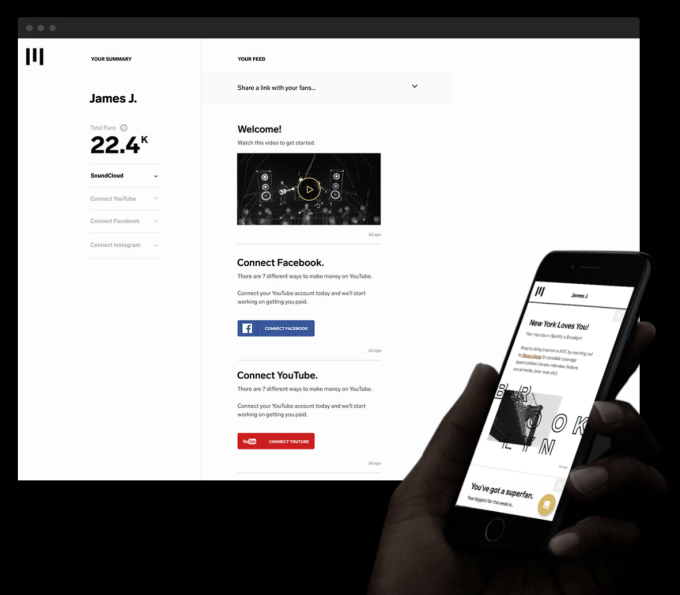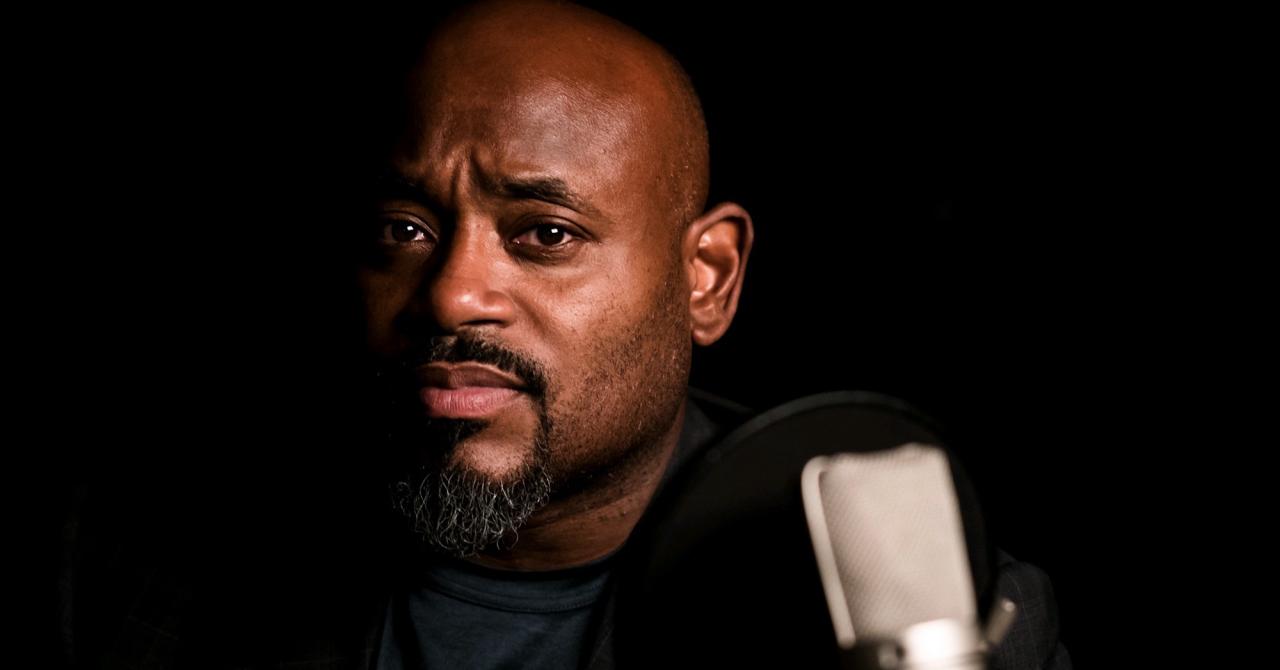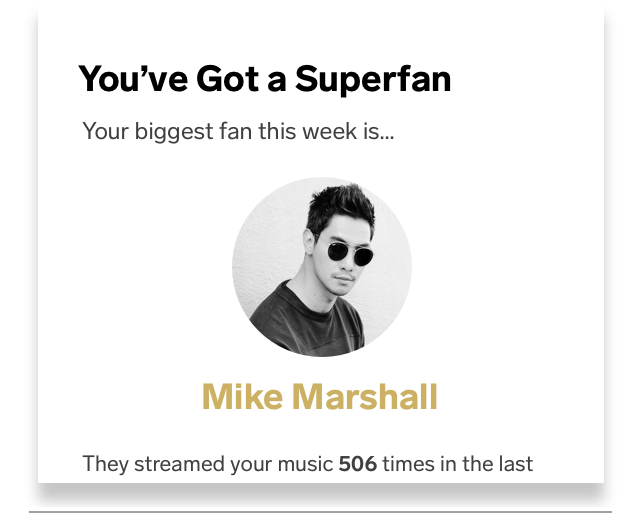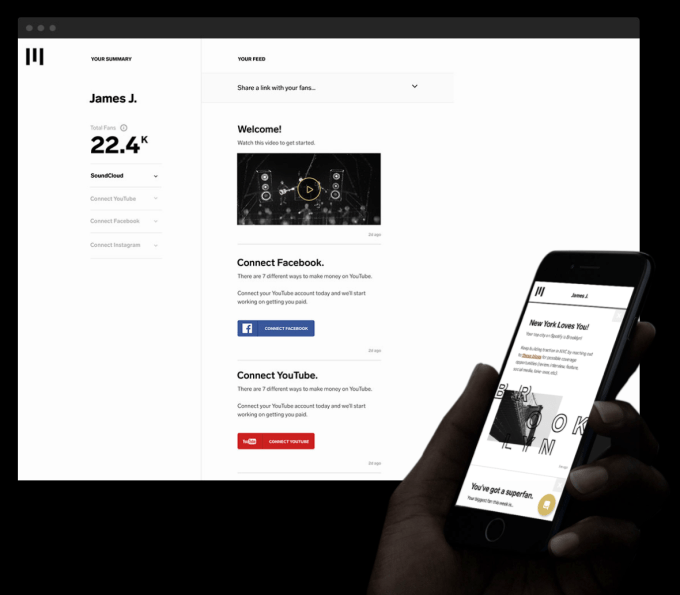
With $70M from Alphabet, UnitedMasters replaces record labels
Tech Industry
Record labels are obsolete. They haven’t kept up as music evolved from selling CDs to streaming songs to promoting concert tickets and merchandise. Labels were meant to help artists generate albums, fame, and money. But now anyone can record themselves and no one “buys” music. So today that requires being a technology company, combining analytics with hyper-targeted advertising. And the old labels don’t have the engineering talent for it.
That’s why last year, the former president of Interscope Records Steve Stoute secretly raised a $70 million Series A led by Google’s corporate umbrella Alphabet and joined by prestigious venture firm Andreessen Horowitz, Silicon Valley investors Floodgate, and entertainment giant 20th Century Fox.
Today, his startup UnitedMasters emerges from stealth.
UnitedMasters is ready to give musicians an alternative to exploitative record label deals. Artists pay UnitedMasters a competitive rate to distribute their music across the internet from Spotify to YouTube to SoundCloud, and they split the royalties while the artist retains the rights to the master recordings. Then UnitedMasters sucks back in all the analytics, identifies the listeners, builds artists a CRM tool, and helps them retarget their top fans with pinpointed ads for tickets and merch.
Stoute explains that the plan is to “Look at music like gaming. You monetize the game to all the people who are most engaged. I wanted to bring that theory and thinking to music.” It’s off those whales, those super fans, where musicians make a lot of their money. And finally someone built a way to deliver ads for what artists do sell to people who’ve listened to their album 50 times for almost nothing.
Stoute had already been working on an ad agency for culture makers called Translation since 2004, and the company will join UnitedMasters as part of Translation Enterprises. Beyond musicians, UnitedMasters will also work with brands looking to advertise to specific segments of listeners. For example, it could assist alcohol magnate Diageo to market its Puff Daddy-affiliated vodka Cîroc to the rapper’s fans.
The startup world’s biggest rap fan Ben Horowitz is so smitten with the idea that he’s joining the board of UnitedMasters. “Steve thought: What if there were a platform that instantly enabled musical artists to market themselves globally as effectively as the top technology companies market to their customers?” Horowitz wrote in a now-published blog post shared with TechCrunch. “Such a platform would free musicians from dependencies on the old model while increasing their income tenfold. It would create unprecedented intimacy between artists and fans, while making artists truly independent.”
It was Larry Page himself that pushed Alphabet to lead the startup’s $70 million Series A. “People don’t know Larry was actually a drummer. He has a deep sensitivity for the artist” says Stoute. Page was stunned that musicians couldn’t keep track of the fans that bring in the most cash and retarget them. So Page worked with Google’s Corp Dev leader David Drummond, a former radio DJ, to invest all the cash UnitedMasters needed.

The Google family is quite gung-ho about upending the recording industry. The first investment of GV (Google Ventures) was Kobalt, a music distribution and rights service. It’s raised over $200 million to track to publish artists’ work and track down royalties, while subsidiary Kobalt Capitol is a platform for investors to buy music copyrights. But Kobalt stops short of helping performers market their tours and t-shirts.
Musicians trust him unlike some technologists. Born in Queens, NY, he used to manage local heroes Nas and Mary J. Blige, turning them into icons. Talking to him, you get the distinct sense that he’s fed up with seeing other musicians get screwed over. He refers to UnitedMasters more like a movement than a mere software company.
Music Tech Is Inevitable, Not The Enemy
The first iteration of UnitedMasters is now live allowing artists to connect their YouTube or SoundCloud accounts to the site and in return receive “personalized guidance on how you can grow your career”. That could include insights into fan demographics or where to route tours.
UnitedMasters is now actively recruiting both tech talent in product, design, and engineering; and its first wave of independent musicians. The team of around 40 features ex-Facebook and Dropboxers. Meanwhile, it’s already working with around 1,000 acts, focusing first on emerging artists who want to be digital natives in how they run their business. “Being able to operationalize independence was the goal of UnitedMasters. There needs to be 250,000 Chance The Rappers” Stoute says, pointing to the fiercely indie hip-hop upstart who won a Grammy as a role model.
Eventually, it could sign established artists who want to ditch their label deals, bet on their long-term potential, and retain control of their original recordings. Instead of a cash advance, a leash, and a sliver of the revenue, UnitedMasters acts as a partner.
Now labels often want a cut of all of the artists’ revenue streams. “Label started doing 360 deals because they margins were drying up [as CD sales declined], but they weren’t providing a 360 service” Stoute chides. “I’m not making the records labels the ‘bad guy’” he qualifies, but declares “The models have to change.” Artists often complain that streaming doesn’t pay enough, but companies like Spotify pay out almost 70 percent of their revenue. It’s the labels withholding more than they deserve.

There are already services like TuneCore for pushing music to the streaming services, and each of them is trying to woo musicians by providing more analytics. Spotify just launched a whole insights app for artists. There are also plenty of merchandise platforms and ticket partners to choose from. But UnitedMasters wants to be the missing data layer for the music business. That could allow it to find a huge fan of an artist on Pandora earning them just fractions of a cent per stream, retarget them with ads on Facebook, and get them to buy a signed poster or VIP ticket package.
Educating artists that there’s another path could be UnitedMasters‘ biggest challenge. Many musicians still think of streaming as the enemy, cannibalizing their album sales, rather than as the inevitable progression of music distribution that can serve as marketing for their band as a brand. But once artists see that they’re not much different from Nike and their songs are like commercials, they realize they need help getting listeners to convert, and turn their passion into a purchase.
There’s room for both the old school labels and startups like Kobalt and UnitedMasters. But artists are beginning to see themselves more as founders building a team of marketing and product specialists, rather than able to get all the diverse servies they need from one company or label. That could make UnitedMasters’ partner model increasingly attractive compared to giving control to an outdated, centralized owner.
“It’s very important that an artist’s jobs is to be a great artist” Stoute concludes. “The infrastructure around them should be helping them get more money at efficient rates, not owning their masters and taking from them.”

Leave a Reply